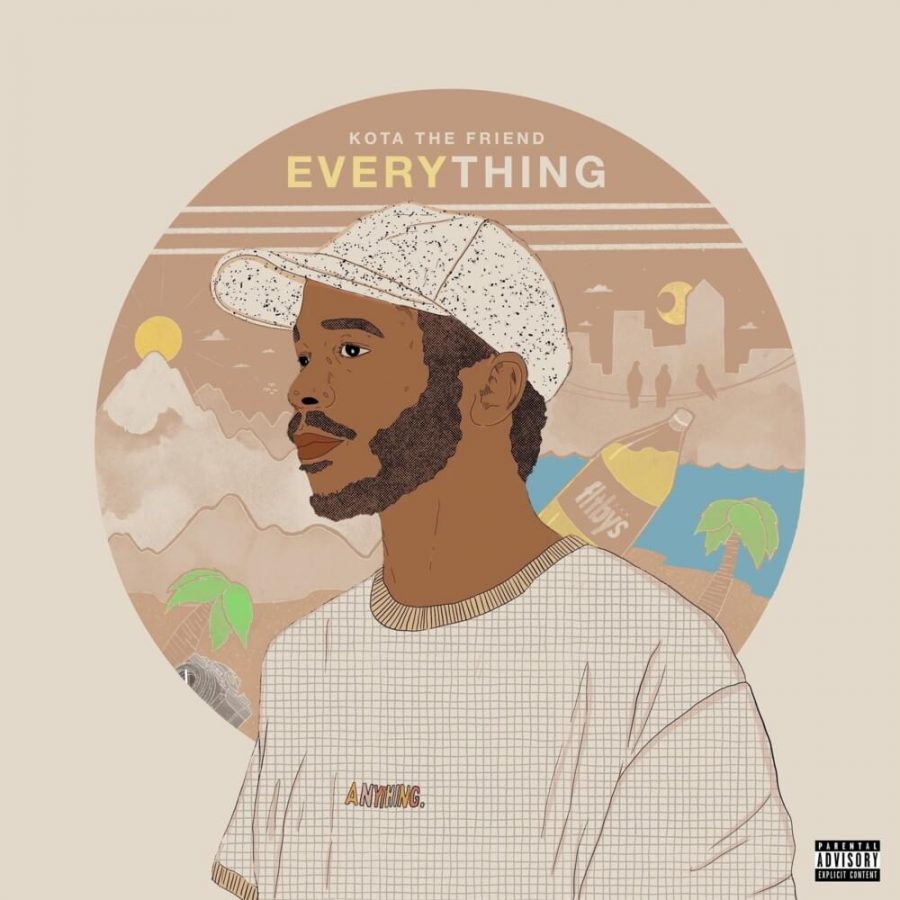A Review of Kota the Friend’s Everything
June 2, 2020
Kota the Friend is a lesser-known rapper based out of Brooklyn, NYC. He’s known for being a successful indie artist, whose low-fi beats and smooth voice draw listeners in. Last Friday, Kota released his newest album Everything. Here is a track-by-track review of the album.
Track 1: “Summerhouse”
Kota started this album off with a banger, and one of my personal favorites on this album. The song begins with the sound of dropping a needle onto a record. It then goes into the most soothing beat on this album. In this track, Kota raps about themes such as success, and how many artists become addicted to it. However, he mentions how he’ll always keep his family in the picture. He considers this to be the saddest song on an extremely positive album, as it talks about how he uses all the negative things in his life to write music. Many people used to doubt him, but now he’s beginning to gain traction in the industry and he’s proving the doubters wrong.
Track 2: “Mi Casa”
While “Summerhouse” talked a lot about negatives in Kota’s life, “Mi Casa” focuses on the positive attitude that Kota maintains. He talks about how, being an independent artist, he’s stayed pretty lowkey, and how because of this he isn’t overly dramatic like many mainstream artists can be. He raps that “[if you] hate on me,” he’ll simply “throw that peace sign” in response. The chorus uses a common phrase “mi casa es su casa,” or “my house is your house” in English. It shows how welcoming Kota is and how if someone shows him love, he’ll “show it back.”
Track 3: “B.Q.E.”
This song was released as a single in late May, and captured my attention before it even came out. It had features from Joey Bada$$ and Bas, two artists I also listen to, and that alone drew me in. The artists all talk about their different experiences in New York City (where all of them are from). They talk about their struggles as artists, and how they’re lucky because they made it while so many others don’t. None of them came from affluent lifestyles, and Joey mentions how “[you] gotta learn to play with the cards dealt.” The messages in this song were inspirational, and it goes to show that if you are truly passionate for something that you can achieve it.
Track 4: “Long Beach”
“Long Beach” featured Hello O’shay, and Alex Banin. This song is a lot different from Kota’s usual material. It has a more uptempo rather than chillaxed beat. This is one of the songs that I don’t enjoy as much, mostly because it isn’t my type of music. I know many other Kota friends enjoyed it, but it simply isn’t my cup of tea. Regardless, it’s still an enjoyable listen, and I recommend it to anyone who likes more of an energetic song.
Track 5: “Lupita’s Interlude”
Lupita Nyong’o is a famous Kenyan-Mexican actress who recently was the star role in Jordan Peele’s latest film Us. She’s an inspiration for many in the African-American community for her success as an actress, and I was excited to see what her interlude would be about. In it, she gives her definition of what everything means to her. It adds an element to the album that gives the title more meaning. The album isn’t just named Everything to be artsy; rather, it has a meaning as proved by this interlude.
Track 6: “Away Park”
During my first listen to this song, I just thought it was a mediocre love song. It’s about two lovers who think about just leaving the lives they’re currently leading, and to start all over. My second listen allowed me to understand more of its themes, and it made it a lot more than a song that just sounds pretty good. Kota also admitted on one of his Instagram posts that “Away Park” was his favorite song of his album, which says a lot about the track having a deeper meaning.
Track 7: “Volvo”
“Volvo” is a single released by Kota in February, and while I was a bit surprised to see it on this album, it was a pleasant one. It’s similar to “Long Beach” in that it has an upbeat tempo, but it also maintains the soothingness that a lot of Kota’s music has. The track talks about how Kota as an indie artist just does his own thing. He doesn’t let anyone negatively influence him, and this is something he lives by. While I would have preferred to see a new song rather than “Volvo,” it’s still a fun listen.
Track 8: “Morocco”
Similarly to “B.Q.E.,” “Morocco” caught my attention because it featured Tobi Lou, another one of my favorite artists. This song is fast-paced, and has some uplifting lyrics. It talks about having success, and just being able to enjoy life as it is. As I said earlier, the majority of the album is extremely positive, and this song is perhaps the most. It’s great to see how Kota and Tobi complemented one another with their different styles and tones, and it’s definitely worth the listen if you’re only a fan of one or the other.
Track 9: “Seven (Interlude)”
This is the main interlude of the album, and it definitely did not disappoint. Unlike the two other interludes, this one is an actual song. It starts off with Kota rapping about the positive things in his life. The music then stops as Kota talks about his son, Lil Kota. He remarks how he’d give up anything just to spend time with his son, and it shows how great of a father figure Kota is. It’s a longer interlude than usual, but it is definitely worth the listen.
Track 10: “Always”
This song is exciting for me because Kota collaborated with KYLE, who is a more well known artist. I loved Kyle’s 2017 hit song “iSPY,” so it was great to hear his voice again. In “Always,” Kota and Kyle rap about battling through adversity. They admit that neither of them are perfect, but they criticize how many other rappers carelessly spend so much money. Since both of them are much smaller artists, they can’t spend nearly as much as artists like Lil Uzi Vert. It is interesting to hear both of their perspectives on it, and it makes the song all the more a better listen.
Track 11: “Lakeith’s Interlude”
Lakeith Stanfield, like Nyong’o, is an African-American actor. Like Nyong’o, he acted in a Jordan Peele film, except he was in Peele’s first film, Get Out. In this, Lakeith talks about his own definition of everything. He mentions how “as long as there is something to strive for, we um validate our existence.” While it is shorter than Nyong’o’s linterlude, it still has just as much meaning.
Track 12: “Everything”
In “Everything,” Kota talks about how he wants to succeed in life. He doesn’t just want to make money, but he wants to know how to earn more money. He wants to be able to spend plenty of time with his son, while also balancing out a successful rap career. I definitely thought, being the cover song of the album, it could’ve been better, but it is still a quality listen. Kota even gave Lil Kota a feature, since Lil Kota is a part of the outro. While it is a rap, it’s more of a recap of Kota’s life, and his ambitions for his future.

















































































































































